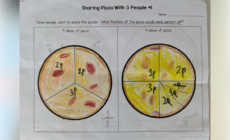-
Masters 2025: 5 PGA Tour Underdogs Who Could Don the Green Jacket - 12 mins ago
-
Israel’s Supreme Court Considers Netanyahu’s Attempt to Fire Spy Chief - 41 mins ago
-
Father Living in US for 30 Years Detained by ICE Over Driver’s License - 47 mins ago
-
Walmart Boycott Update—Blackout Organizer Tells Protesters ‘Hold the Line’ - about 1 hour ago
-
Jeremiah Ostriker, Who Plumbed Dark Forces That Shape Universe, Dies at 86 - about 1 hour ago
-
National Economic Blackout on April 18: What To Know About Boycott - 2 hours ago
-
China Accuses U.S. of Blackmail After Trump Threatens More Tariffs - 2 hours ago
-
Would Donald Trump Defend Taiwan? - 3 hours ago
-
Some Calm Returns to Asian Markets Even as Trade Tensions Escalate - 3 hours ago
-
Dad Stumped Over Daughter’s Second-Grade Math Homework About Pizza - 3 hours ago
Opinion | Trump’s Crusade Against Antisemitism Is Extremely Bad for the Jews
Taking a break from her work dismantling her own department, Secretary of Education Linda McMahon last week threatened roughly $9 billion of grants and contracts with Harvard because of “the school’s failure to protect students on campus from antisemitic discrimination.” As shocking as that threat was, it wasn’t entirely a surprise: Since the Justice Department convened its Task Force to Combat Antisemitism, 60 universities have received notice that they are being monitored or investigated.
With an administration seemingly determined to do everything, everywhere, all at once, discerning its true priorities can sometimes be challenging. But on this one point, Donald Trump wants no ambiguity: “My promise to Jewish Americans is this,” he said on the campaign trail. “With your vote, I will be your defender, your protector, and I will be the best friend Jewish Americans have ever had in the White House.”
As the first Jewish president of a formerly Methodist university, I find no comfort in the Trump administration’s embrace of my people, on college campuses or elsewhere. Jew hatred is real, but today’s anti-antisemitism isn’t a legitimate effort to fight it. It’s a cover for a wide range of agendas that have nothing to do with the welfare of Jewish people.
All of these agendas — from dismantling basic government functions to crushing the independence of cultural and educational organizations to criminalizing political speech to legitimating petty presidential vendettas — endanger the principles and institutions that have actually made this country great. For Jews, a number of these agendas do something more: They pose a direct threat to the very people they purport to help. Jews who applaud the administration’s crackdown will soon find that they do so at their peril.
Among the first high-profile targets of the anti-antisemitic push have been a recent Columbia graduate and a current Tufts University graduate student, one a lawful permanent resident of this country and the other one here on a student visa, who spoke out in favor of Palestinian rights. Both have been handcuffed, driven off and indefinitely detained. Neither has been charged with a crime.
Abductions by government agents; unexplained, indefinite detentions; the targeting of allegedly dangerous ideas; lists of those under government scrutiny; official proclamations full of bluster and bile — Jews have been here before, many times, and it does not end well for us. The rule of law and the right to freedom of thought and expression are essential safeguards for everyone, but especially so for members of groups whose ideas or practices don’t always align with the mainstream. As M. Gessen recently wrote in these pages, “A country that has pushed one group out of its political community will eventually push out others.” What our government is doing now is wrong in itself, but beyond that, it poses a bigger threat to Jewish people’s safety than all the campus protests ever could.
I’ve received a trove of emails asking whether Jews are welcome at Wesleyan. In my (lucky) 18th year as Wesleyan’s president, I am pleased to tell them that Shabbat dinners are well attended, the Israeli Film Festival is offering excellent cultural fare and Jewish studies courses — one on the archetype of the Jewish mother, taught by an Israeli — are oversubscribed. Of course we’ve had protests, with Jews on both sides of them. Some of the students having grown up in communities of like-mindedness are surprised there is more than one side of an issue. In some cases, that is enough to awaken their anxieties.
The situation was different at Columbia. Protests became violent (both in the actions of the participants and those of the police who were called in to quell them). Tensions between supporters of Palestinians and Israelis were at times extreme. In the pages of The Atlantic, Franklin Foer recently documented some serious antisemitic activity. All of which is presumably why Columbia was the first to be singled out by the forces of anti-antisemitism.
But in other ways, Columbia is an odd choice. It has the second highest percentage of Jewish students in the Ivy League. Secretary McMahon has said the government is canceling $400 million of federal support for the school because of its failure to protect Jewish students. Federal cuts to Columbia, however, will disproportionately affect Jewish students.
And when the White House announced the cuts, it did so with a tweet that said “SHALOM COLUMBIA.” You don’t have to be Jewish to hear a large measure of sarcasm in those words.
That kind of tension — between championing Jews and ridiculing, reviling, or in some cases even threatening them — has been visible on the right for some time. Consider first the president: On the one hand, his daughter, son-in-law and grandchildren are Jewish. (Ivanka Trump converted to Judaism when she married Jared Kushner.) On the other hand, when neo-Nazis, Klansmen and others marched through Charlottesville, Va., carrying torches and shouting “Jews will not replace us,” Mr. Trump condemned the most extreme elements of the rally but observed that there were “some very fine people on both sides.”
A “Severance”-level disconnect between an image of Jews as both vulnerable people who must be protected and powerful people who must be defeated, is now widespread. Last year when Congress drew up a bill to oppose antisemitic speech on college campuses, many legislators raced to voice their support. But not some of MAGA’s most prominent representatives, including Matt Gaetz and Marjorie Taylor Greene, who had no objection to fighting antisemitism but observed that the language of the bill would interfere with Christians’ ability to accuse Jews of killing Christ. At other times, agreeing with Vladimir Putin, she has said that the Jewish president of Ukraine was running “a Nazi army.”
The prominent Trump supporter Candace Owens has said that Jeffrey Epstein was working for Israel, a nation that has gotten blackmail “down to a science.” The MAGA hero (and subject of sex trafficking charges) Andrew Tate has encouraged people to “question” their criticism of Hitler — and to bring back the Nazi salute, while they’re at it — and said that “the people who wrote the official story” of the Holocaust “have used it to subvert the consciousness of Western populations into mass genetic suicide.”
Elise Stefanik, the third-ranking House Republican, has ferociously defended Jews against antisemitism in higher education, leading intense questioning of three university presidents, two of whom soon after lost their positions. In other settings, however, she has used language similar to the “great replacement theory,” the same xenophobic conspiracy theory that the Unite the Right participants in Charlottesville were chanting about.
Nick Fuentes, who had dinner with Mr. Trump in 2022, lists “the influence of Jews” as one of the two biggest problems in the world, and announced that “Talmudic Jews” have to leave the country or be converted. As for Mr. Trump himself, he declared that Senator Chuck Schumer is “not Jewish anymore,” which reminded me of Karl Lueger, a raging antisemite and fin-de-siècle mayor of Vienna, who declared, “I decide who is a Jew.” Leo Terrell, the head of Mr. Trump’s antisemitism task force, shared a tweet by a prominent white supremacist that lauded the president’s “ability to revoke someone’s Jew card.”
As Oscar Hammerstein II put it in “The King and I”: “If allies are strong with power to protect me/Might they not protect me out of all I own?” These are our defenders? SHALOM, indeed.
In the Long Island town where I grew up, Jews were a minority. My father taught me how to punch antisemites before getting hit — when I was in elementary school! And he emphasized to me that I should expect to encounter such people wherever I went, especially as I moved into unfamiliar professional or social settings.
Today I encounter many young Jews who are shocked by anti-Israel attitudes (even from fellow Jews, part of the long history of Jewish antizionism). They are shocked by how many progressives decry ethnostates but somehow mention only Israel, or how readily people, when given half a chance, will express what the historian Deborah Lipstadt has called “clueless” antisemitism. Political events seem to expand their license to do so. If you feel righteous about being an anti-colonialist, why worry about a little antisemitism? Like the white supremacists liberated by mainstream anti-D.E.I. language, these antisemites hear perfectly legitimate criticism of, say, the Israeli government, and regard it as an opportunity to unfurl the true extent of their prejudice.
The novelist and scholar Dara Horn has speculated that as the memory of Nazis and the Holocaust dimmed, “the public shame associated with expressing antisemitism was dying too — in other words, hating Jews was normal.” Which means we should expect things to get even worse.
Given all this, there is a great temptation for Jews to embrace anyone who denounces antisemitism, regardless of the moral contradictions (or the dubious connection between protecting religious minorities and, say, cutting grants for cancer research). “We appreciate the Trump Administration’s broad, bold set of efforts to counter campus antisemitism,” the Anti-Defamation League said in response to the detention of Mahmoud Khalil, the legal permanent resident, “and this action further illustrates that resolve by holding alleged perpetrators responsible for their actions.”
As Sam Adler-Bell has recently noted, some American Jewish organizations have encouraged the erosion of rights and norms in exchange for support for Israel. The president hadn’t been in office a full day before the ADL spoke up to defend Elon Musk for throwing what sure looked to me like a Sieg Heil. After weathering intense criticism over its support for Mr. Khalil’s abduction, the organization’s chief executive last week restated the need for due process. How did we get to the point where that’s even in doubt?
The ADL was founded in 1913, in the wake of the case of Leo Frank, a Jewish man accused of murdering a 13-year-old Christian girl. Most historians today agree that Frank, who was lynched in 1915, was wrongly convicted after a sham trial, but the MAGA folks on X can’t help but celebrate the lynching of a Jew. “He got exactly what he deserved,” exclaimed Lauren Witzke, a 2020 Republican Senate nominee, “and everyone in that crowd should have received medals for protecting their community.”
Kingsley Wilson, the 20-something deputy press secretary at the Pentagon, praised the far-right party Alternative for Germany by invoking the Nazi slogan “Ausländer raus!” (“Foreigners out!”). As the traditional conservatives at Bulwark put it, “The ‘vibe shift’ is not necessarily that more people on the right are antisemites compared to eight years ago, but that much of the right now appears to reject the basic notion that there should be any stigma against even the vilest bigotry.”
That’s why the “instrumentalization of Jewish fear” is so pernicious. Those who attack people like Mahmoud Khalil today will be breaking bread with the “Ausländer raus!” folks tomorrow. They will seek new targets. Who’s next?
In the second and first century B.C., the Jewish kingdom of Judea aligned itself with Rome to protect itself from the domination of Greek culture. Rome obliged, and conquered Judea for itself. The enemy of our enemy was not our friend. There’s a lesson there, if we can heed it.
Here’s another, from the Pirkei Avot, a compilation of rabbinical ethical teachings: “Be cautious with governments, for they bring a person close to them only for their own needs. They appear as friends when it benefits them, but they do not stand by a person in his time of difficulty.” Some Jewish people feel gratified to hear the president say he’ll defend us, but today’s ruling authorities will not be good for the Jews.





















